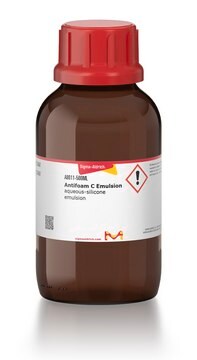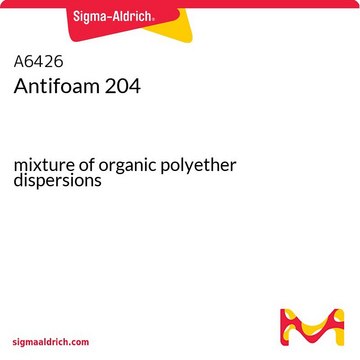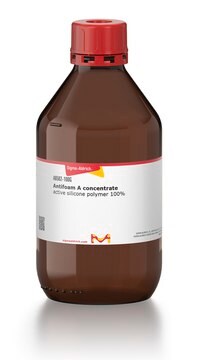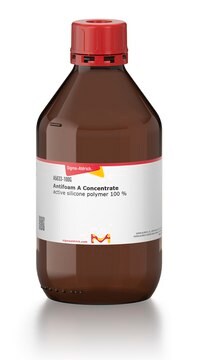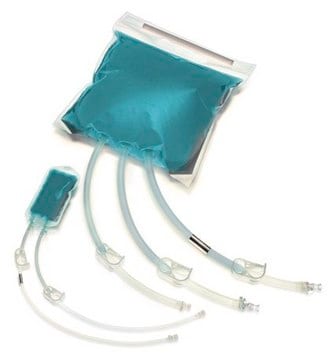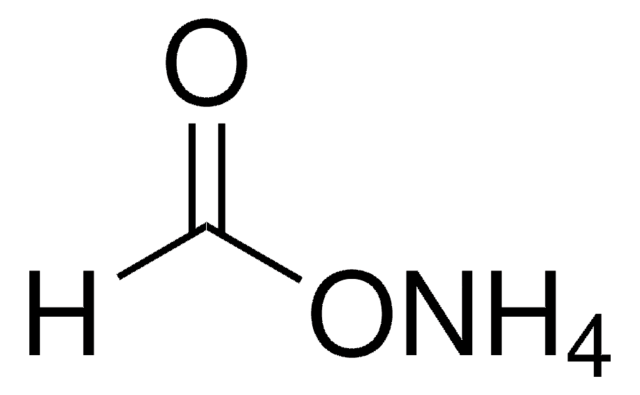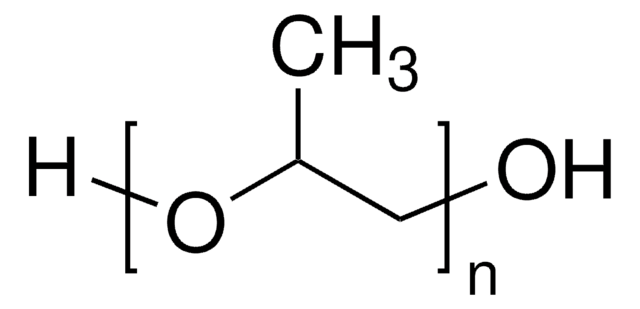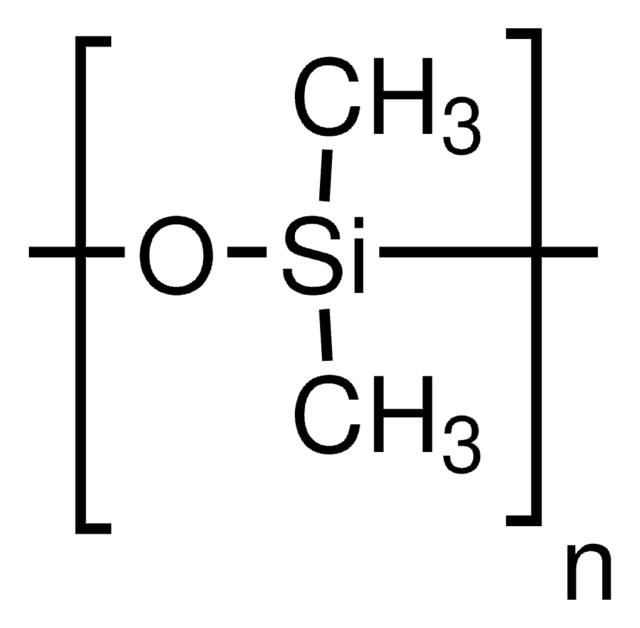A8582
Antifoam SE-15
aqueous emulsion for bacterial and mammalian systems
Synonyme(s) :
silicone-based antifoam
Se connecterpour consulter vos tarifs contractuels et ceux de votre entreprise/organisme
About This Item
Code UNSPSC :
12161901
Nomenclature NACRES :
NA.85
Produits recommandés
Niveau de qualité
Forme
emulsion (aqueous)
Concentration
10% (active silicon)
Technique(s)
cell culture | hybridoma: suitable
Solubilité
H2O: soluble (effective hot or cold.)
Densité
1.0 g/mL at 25 °C
Application(s)
microbiology
Température de stockage
room temp
Adéquation
(Mammalian (suspension))
bacteria (fermentation)
Description générale
Antifoam SE-15 is a silicone-based product used to prevent or minimize foaming in both microbial fermentation systems and mammalian suspension cultures. Control of foaming minimizes damage to the cells, resulting in increased protein/antibody production.
Application
Antifoam SE-15 has been used:
- in the preparation of ramified rolling circle amplification (RAM) amplification buffer.
- to find its effects on cell viability, virus infectivity and PCR (polymerase chain reaction) performance.
- as a constituent of phosphate-buffered saline (PBS) for the determination of total antioxidant status (TAOS) by 2,2′-azino-bis(3-ethylbenzothiazoline-6-sulfonic acid (ABTS) assay.
- as a component of autoinduction expression culture.
- as a component of cyclic adenosine monophosphate (cAMP) detection buffer.
Caractéristiques et avantages
- Controls foaming in microbial culture flasks or fermentations
- Non-toxic to the culture medium
- Can be pumped to fermenter on an as-needed basis
Composants
Antifoam SE-15 is an aqueous emulsion containing 10% active silicon and non-ionic emulsifiers .
Notes préparatoires
Antifoam SE-15 can be pre-diluted with 3-10 parts of cool water to aid in dispersion. Pre-diluted
suspensions should be used immediately.
suspensions should be used immediately.
Produit(s) apparenté(s)
Mention d'avertissement
Warning
Mentions de danger
Conseils de prudence
Classification des risques
Eye Irrit. 2 - STOT RE 2 Inhalation
Organes cibles
Lungs
Classe de danger pour l'eau (WGK)
WGK 1
Faites votre choix parmi les versions les plus récentes :
Déjà en possession de ce produit ?
Retrouvez la documentation relative aux produits que vous avez récemment achetés dans la Bibliothèque de documents.
Les clients ont également consulté
Dario A Vitturi et al.
American journal of physiology. Heart and circulatory physiology, 296(5), H1398-H1407 (2009-03-17)
Allosteric regulation of nitrite reduction by deoxyhemoglobin has been proposed to mediate nitric oxide (NO) formation during hypoxia. Nitrite is predominantly an anion at physiological pH, raising questions about the mechanism by which it enters the red blood cell (RBC)
Detection of nucleic acid targets using ramified rolling circle DNA amplification: a single nucleotide polymorphism assay model
Smith J H and Beals T P
PLoS ONE, 8(5), e65053-e65053 (2013)
Elisa Binda et al.
BMC biotechnology, 13, 24-24 (2013-03-19)
VanYn, encoded by the dbv7 gene (also known as vanYn) of the biosynthetic cluster devoted to A40926 production, is a novel protein involved in the mechanism of self-resistance in Nonomuraea sp. ATCC 39727. This filamentous actinomycete is an uncommon microorganism
James H Smith et al.
PloS one, 8(5), e65053-e65053 (2013-06-01)
Isothermal amplification methods provide alternatives to PCR that may be preferable for some nucleic acid target detection tasks. Among current isothermal target detection methods, ramified rolling circle amplification (RAM) of single-stranded DNA circles that are formed by ligation of linear
Jiayi Jin et al.
Insect biochemistry and molecular biology, 118, 103310-103310 (2019-12-25)
Many arthropod venom peptides have potential as bioinsecticides, drug leads, and pharmacological tools due to their specific neuromodulatory functions. Assassin flies (Asilidae) are a family of predaceous dipterans that produce a unique and complex peptide-rich venom for killing insect prey
Notre équipe de scientifiques dispose d'une expérience dans tous les secteurs de la recherche, notamment en sciences de la vie, science des matériaux, synthèse chimique, chromatographie, analyse et dans de nombreux autres domaines..
Contacter notre Service technique